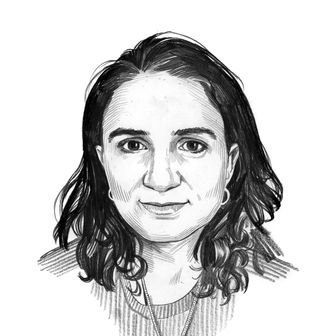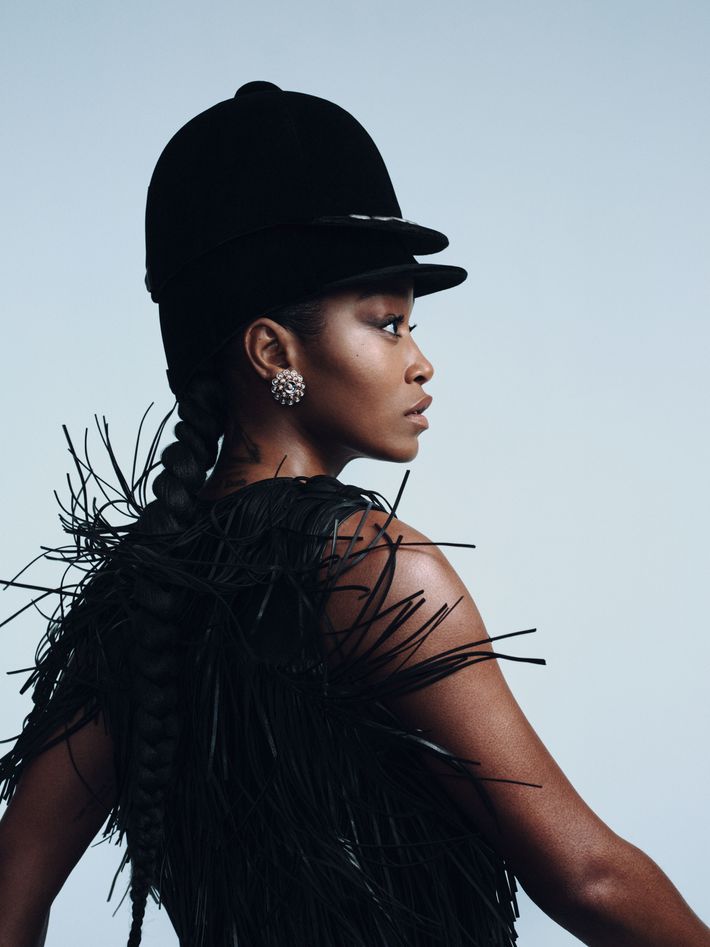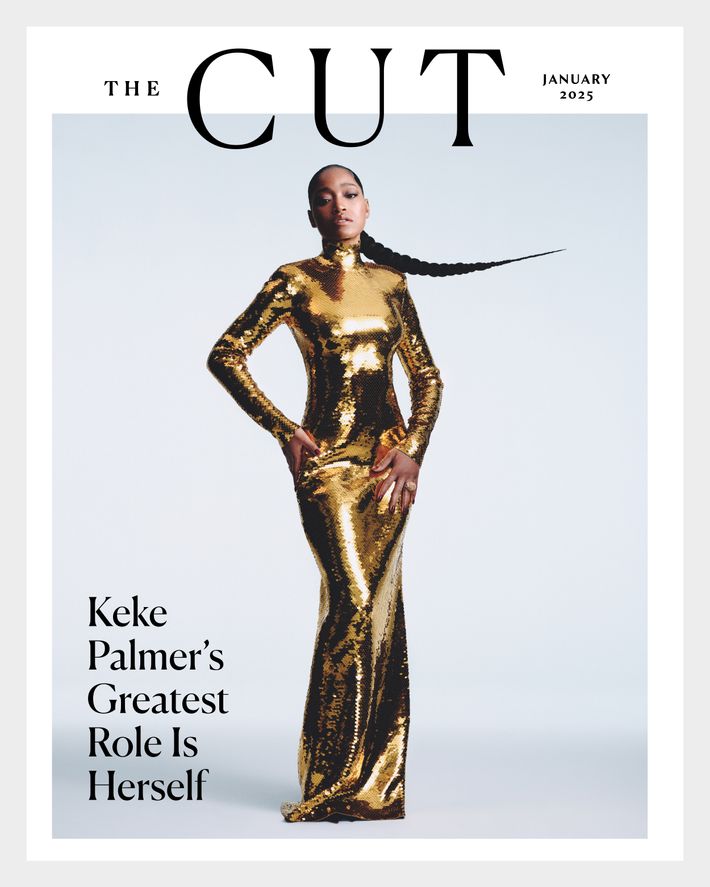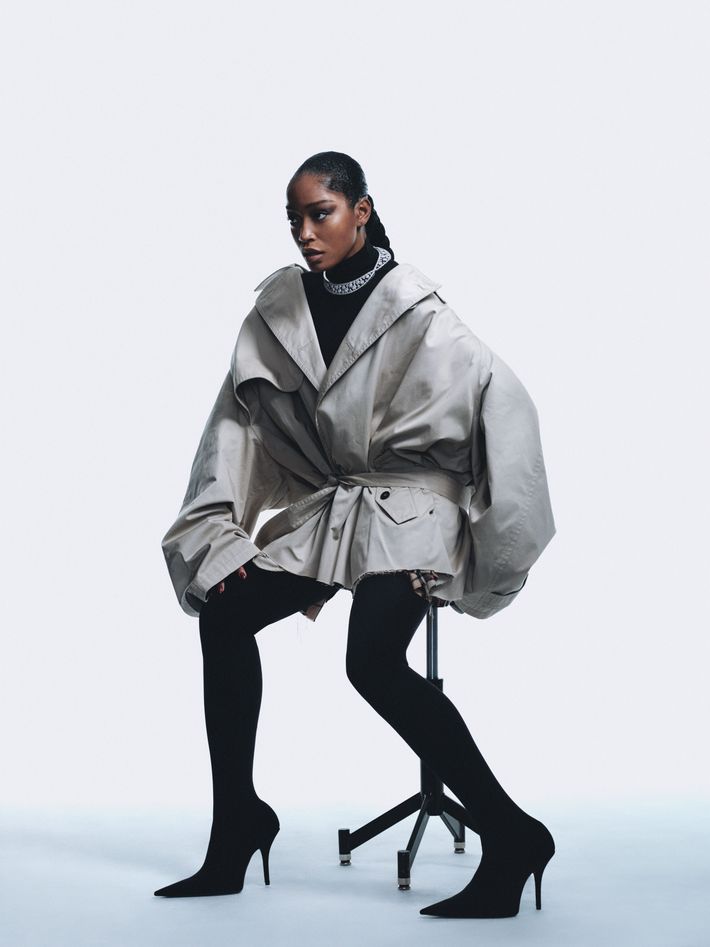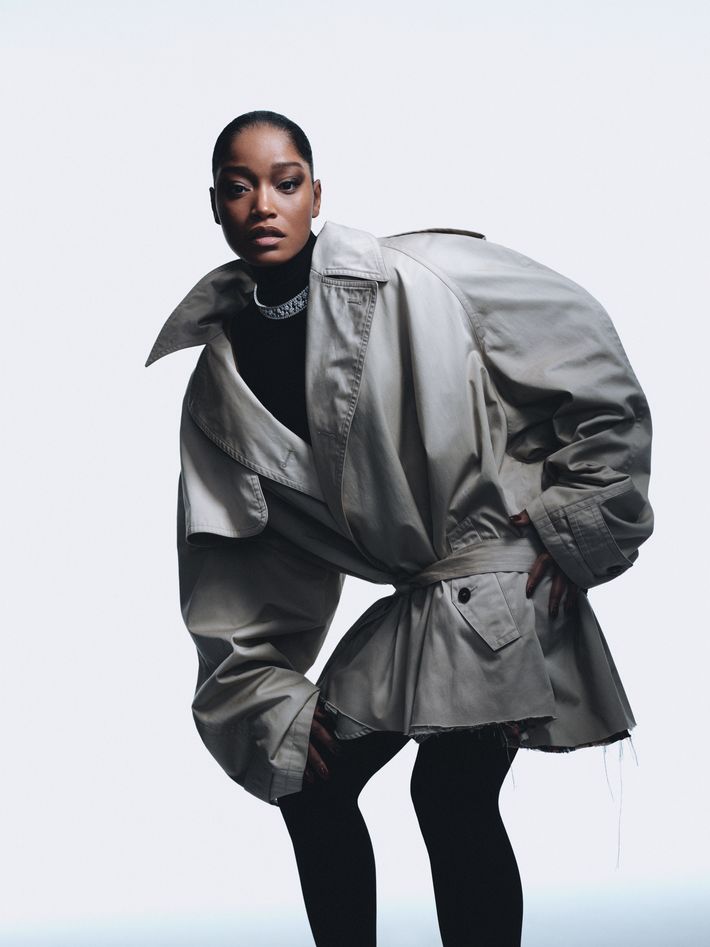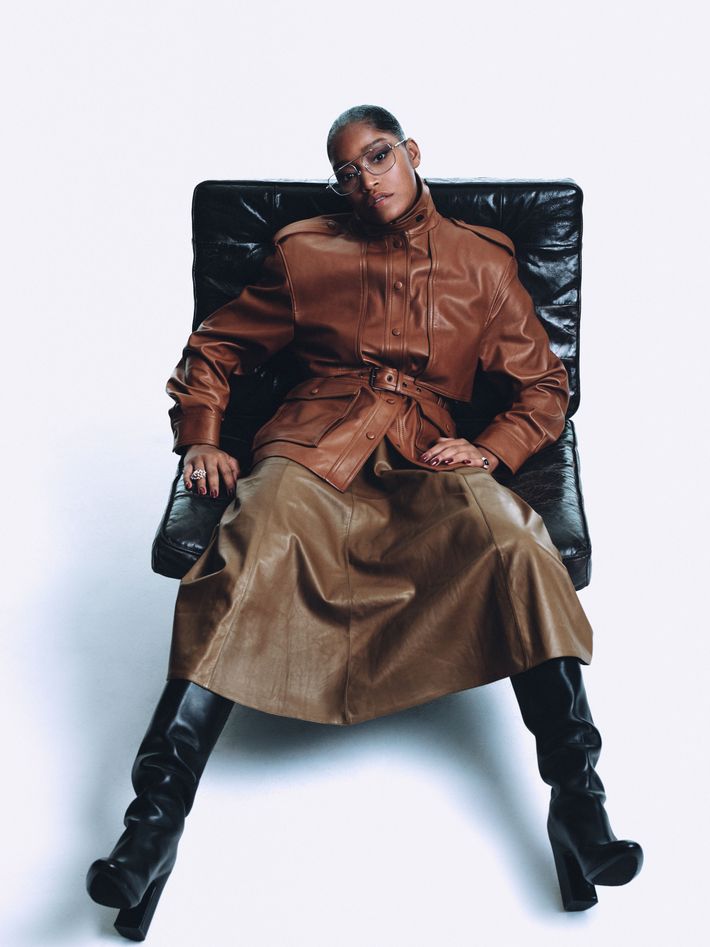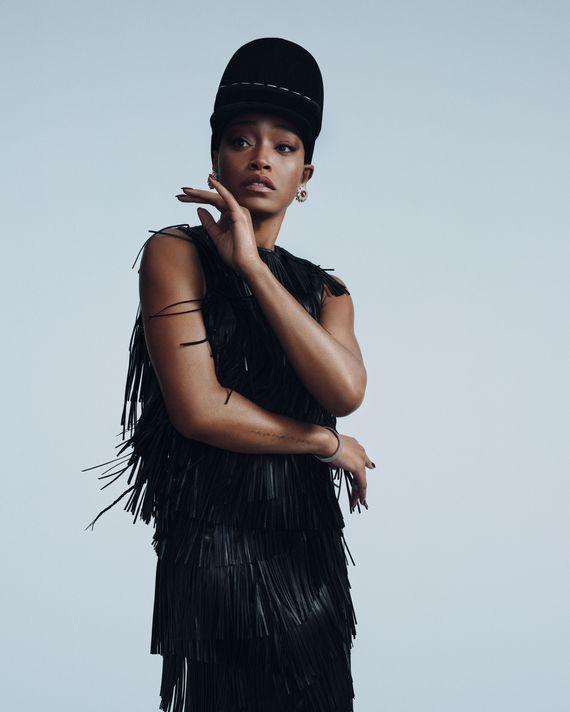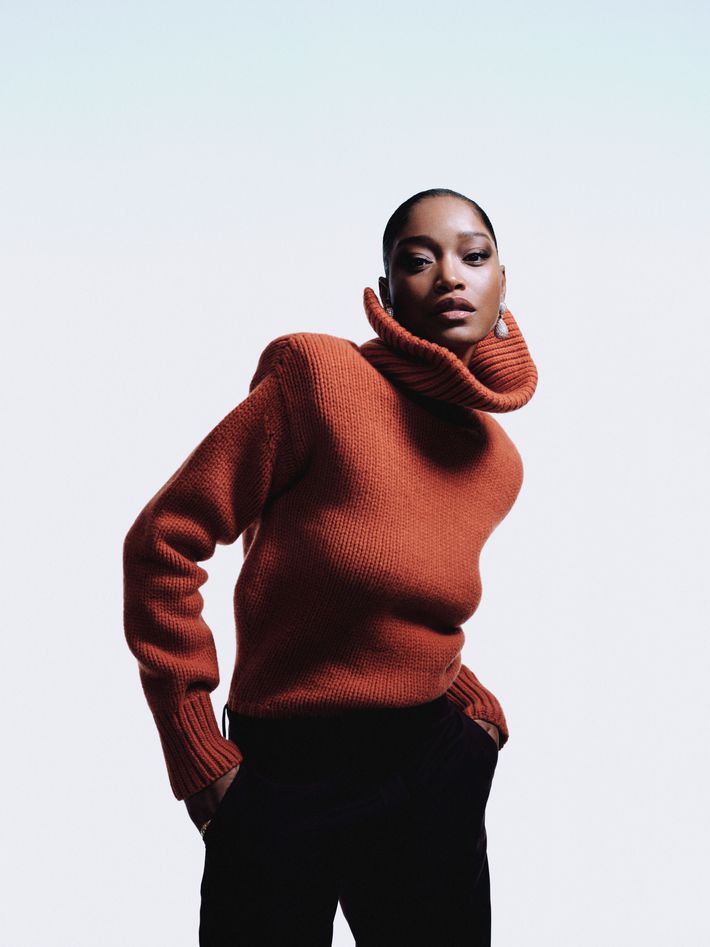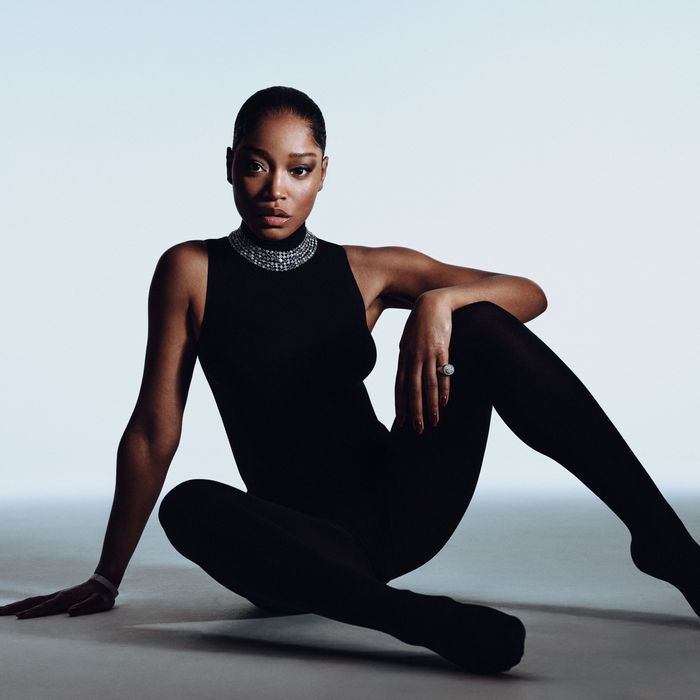
When Keke Palmer’s trying to think of the name of a famous person, she doesn’t list what roles they’ve played or what projects they’ve been in, as most people do. We’re sitting at Le Crocodile on a frigid Sunday morning in December, and as she’s Googling whether the buckwheat pancakes are gluten-free (they aren’t), I happen to mention a certain Bravo reality-TV show. “Oh, yeah, I’ve seen a few episodes of that,” she says. “Is that with the older lady who’s like —” At which point she squints, pouts her lips, and screws her features up into a steely gaze, a precise conjuring of Lisa Vanderpump in her season-ten Vanderpump Rules cast photo.
Palmer does this a few times during our conversation: when she’s talking about Trisha Paytas (“She’s that white lady, right? Is she not white?,” she asks, imitating Paytas’s trademark pout. “What’s the history of her?”), about her former costar Angela Bassett in The Jacksons: An American Dream (she performed her impression in front of her a few years ago for Vanity Fair, to Bassett’s delight: “that’s probably my best one,” Palmer says), and about Ariana Grande (the week before, Palmer went viral for impersonating Grande introducing Patti Labelle at Grande’s 16th-birthday party: “I remember thinking, like, bitch, what is Patti Labelle doing here?”). Grande, of course, constantly generates headlines for her dead-on impressions, but Palmer might be an equally adept mimic. She has a preternatural gift for capturing someone’s facial expression to convey their general vibe, like a vaudeville comedienne or a caricaturist at a corporate event.
It’s funny and entertaining — and Palmer is naturally both of those things — but you also get the sense that she is a person who spends a lot of time on the sidelines, observing other people and taking notes. “I don’t think there’s anything more tragic than being a person,” she says. “And exploring all the ways that people deal with the chaos is, I think, coping for me.”
In August, Palmer published her second book, Master of Me, a hybrid memoir and self-help manual. She appears on the cover as both puppet and marionette, a nod to her past as corporate-stamped child star and her present as a self-branded mogul. It’s an evolution that has taken place over the course of many years: She now has her own podcast, plus a multimedia network called KeyTV, and has forged an enviable acting career as an adult, working with such luminaries as Jordan Peele in Nope and Lorene Scafaria in Hustlers. This week, the buddy comedy One of Them Days, in which Palmer co-stars opposite SZA as a young woman trying to make a living in Los Angeles’s rapidly gentrifying Baldwin Hills neighborhood, finally hits theaters. The film was in development for nearly five years, and it was a true labor of love for Palmer, who was also an executive producer: The script went through four different iterations before the final version, and Palmer grappled with the studio to maintain focus on the central theme of maintaining a community amid rapid economic change. Between One of Them Days and a slew of upcoming high-profile projects, she has stepped off the sidelines and begun actively taking control of her own destiny. “I have always been an observer of myself,” she writes in her book’s introduction. “For years, at the mercy of others. Not anymore.”
We’re in a cultural moment dominated by former child stars — both Grande and Selena Gomez were nominated for Golden Globes this year, and Miley Cyrus won Record of the Year at the Grammys. Meanwhile, a series of explosive tell-alls have purported to show what life is really like for camera-ready tweens, from the 2024 documentaries Quiet on Set and Child Star to Jennette McCurdy’s memoir, I’m Glad My Mom Died.
Master of Me gestures at the traditional narrative of what it’s like to be a child entertainer: the intense pressure to live up to adult expectations, the tendency to constantly perform for others, the realization that you have to look after yourself when there aren’t any grown-ups around. But her experiences at Nickelodeon weren’t the same as those of some of her former colleagues — she says she wasn’t, for instance, pushed into inappropriate situations by network execs. “Sure, the child-star industry is inherently exploitative. But everything is inherently exploitative,” Palmer says. “Everything is a problem, and everything is hurting somebody else. No disrespect to anybody else, because everyone else’s experience is valid. But I don’t want to group my experiences with theirs because that’s not how I think. And I think that’s a big part of how I’ve survived.”
The standard child-star trajectory is well-known, leading from Disney or Nickelodeon to rehab to tell-all memoir or confessional studio album. Palmer has been able to avoid it, she says, by being scrappy, resilient, and, above all else, likable. An innately charismatic, affable person with a knack for TikTok-ready bon mots, Palmer can’t help but be amusing, even when she’s sitting down to order. “I am not familiar with those brands,” she tells the waiter after he recites a list of Le Crocodile’s artisanal teas, her delivery as deadpan as her viral “I’m sorry to say, I don’t know this man” clip.
Palmer is well aware that this is primarily where her gifts lie: in putting people at ease and making them smile and laugh and feel good about themselves. It’s something that comes through in every single one of her performances, from Em Haywood, the nervy horse wrangler of Nope, to Dreux, the ambitious, no-nonsense pancake-house waitress in One of Them Days. At one point, the light is shining directly in her eyes, but she’s too polite to say anything until I offer to flag down the waiter for another table.
“People may have made fun of me for this, but I need everything to be comfortable that I’m doing. I don’t want discomfort for anybody,” she says over egg whites, bacon, and strips of avocado. “You know what I mean? That’s part of what makes me the entertainer that I am: I transform things, and I optimize them.”
She’s had a lot of practice doing this. Palmer grew up in a working-class Illinois suburb, the second child in a family of four. She sang in a church choir and performed in community theater before auditioning for mainstream Hollywood roles with her mother accompanying her to auditions while her father stayed home with her siblings. “My parents were very gender-nonconforming in their relationship,” she says. “My dad always washed our clothes and sewed and put relaxers in our hair. He was more than the leader of our family — he was our hero.”
After landing her breakout role as the precocious title character in 2006’s Akeelah and the Bee, Palmer tried out for a number of big roles, including the critically acclaimed Ryan Gosling film Half Nelson (on her behalf, Palmer’s parents turned down that role, which was ultimately played by Shareeka Epps: “After Akeelah and the Bee, they didn’t think it was good for me to play a drug dealer,” she says. “They were very cautious about the roles I played as a young Black child.”) It wasn’t until 2008 that Palmer landed the part that would launch her into bona fide child-stardom: the eponymous lead of True Jackson, VP, about a plucky 15-year-old fashion executive. It is, to date, the role that Palmer says she most relates to. “She was climbing a corporate ladder, working a grown-up job as a kid. I felt the same way,” she says.
True was also able to triumph over adversity without support from her parents, who are rarely seen onscreen. That feeling of needing to parent yourself at a young age resonated with Palmer. “She was making it happen for herself independently in the world,” Palmer says. “Growing up with that character — it bled over into how I wanted to show up, how I want to deal with life.”
As her family’s main source of income, Palmer says she was acutely aware that her parents needed her to keep booking roles, and she felt isolated from them as a result. “I hated my parents for a long time,” she says. “There was so much pressure to rise to the occasion for my community, for my parents, for my siblings, for their sacrifices. They weren’t saying it, but that was the reality. Because I’m the one that we all came here for.” She constantly felt pushed into situations she was too young to handle: Once, she says, her former manager told a then-12-year-old Palmer that her mother was going to die if she didn’t lose weight. “That really, really traumatized me and stressed me out,” she says. “It got me thinking she was going to die, thinking about things like medical bills. It was just too much.”
Even though True Jackson, VP was successful, Palmer was acutely aware that as a young Black woman in Hollywood, “people were putting limitations on me,” she says bluntly. “I wasn’t necessarily in the same conversations as Victoria Justice or Selena Gomez or Miley Cyrus at that time. It was very much ‘That’s the Black show’ or ‘That’s Keke Palmer, the Black girl on the network.’” It was not a feeling she was unaccustomed to: Back in Illinois, she had been the only Black child in her private-school class. “There is a loss of innocence that comes with the awareness that you’re treated differently that I’d accepted a long time ago,” she says. Now, she says, she feels differently. “I don’t compare myself to anyone,” she says. “But I definitely don’t compare myself to any white person.”
After True Jackson went off the air in 2011, Palmer, then 18, auditioned for a number of projects: the 2012 movie musical Sparkle, a Fast and the Furious movie. Few of these attempts bore fruit. “You’re at this weird age where you’re too young for the kind of roles that you would want and you’re too old for the kind of roles you used to get,” she says. “Your brand was made up of you being a kid, and you’re not a kid anymore. So you have to build a new one.” She briefly returned to her first love, singing, and released the EP Lauren (her birth name) through Island Records. But the music industry struggled to figure out how to package her. “You need to know how to understand data and how to speak to people who are not creative so they can make more money,” she says. “Music is a numbers game. It feels a little more soulless.”
In 2015, Palmer was cast in Scream Queens, Ryan Murphy’s horror-parody TV series. She played a role similar to that of True Jackson: Zayday Williams, a plucky sorority girl constantly battling ax-wielding murderers and queen-bee microaggressions. The experience wasn’t a positive one; in her book, Palmer writes about a female co-star (she doesn’t say which one) who mockingly compared her to Martin Luther King Jr. The story was picked up by a number of tabloids, but the actor in question, Palmer says, has yet to apologize. She did, however, reach out on Instagram to congratulate Palmer on the release of her book. “I was like, ‘Hey, thanks, it feels good,’” she says, laughing. “She was just checking the temperature. She knows what she did.”
It’s not the only Scream Queens anecdote in Palmer’s book. One day, she writes, she was about to leave the set when a crew member asked her to stay and keep working, even though they had previously agreed she would take that time off. Because she had other work obligations, she said no. “Ryan was really angry with me,” she writes. “He ripped into me, and I took it.” When I ask if she’s heard from Murphy since, she answers carefully. “Not directly,” she says. “I definitely think that he thought that I could have been attacking him or trying to shame him or send the mobs after him,” she says. “But the point of my bringing up Ryan Murphy wasn’t ‘Fuck Ryan Murphy, he ain’t shit.’ It was, ‘Look, I did what I had to do for me, and it caused me an issue with one of the most popular and successful men in the industry, and sometimes getting to your personal success may cost you to do the same thing.’” Since Scream Queens, Murphy has yet to hire Palmer again, but that doesn’t faze her. “That was just a job. It wasn’t the end goal,” she says flatly. “That was a stepping stone to me building the Keke Palmer brand.”
In the decade since, that’s exactly what Palmer has done. Following her critically acclaimed turn in Jordan Peele’s Nope, she landed a gig hosting NBC’s revival of the old-school game show Password, winning her a Daytime Emmy; she also hosted the pre-show for the Met Gala, leading to a now-infamous viral moment in which she flagged down Megan thee Stallion with a hearty “You know it’s your girl!”
In 2022, she launched KeyTV with her best friend, Nora Addison, whom she met via the digital media company AwesomenessTV after it helped produce scripted content for Palmer’s YouTube channel. “It was such a new thing for me when we met to be friends with someone who was my age,” she says. “Because usually my friends were someone I worked with who was, like, 15 years older than me.” Addison, who had grown up watching Palmer in Akeelah and the Bee, was impressed by her work ethic, as well as by her keen ability to observe and relate to others. “If she wasn’t doing entertaining, she’d probably be a hairstylist or a therapist or something like that,” says Addison. “She totally is an observer and a conduit to energy and an empath and a reader of people.”
The dynamics of that BFF-ship aren’t dissimilar to those in One of Them Days, which features SZA as Alyssa, the flighty, astrology-obsessed best friend of Dreux. (Palmer says she relates more to Dreux, but Addison says Palmer also has Alyssa-esque, “go with the flow”–type energy; they spent the other night lounging in front of the TV, watching Emily In Paris and drawing in affirmation coloring books for Black women.) The movie follows the two women as they scramble around Los Angeles to try to make their rent.
SZA, whom Palmer met when they appeared on SNL together in 2022, makes her feature-film debut. “A lot of people think musicians can’t act, but she’s just naturally hilarious,” Palmer says of her costar. “As vulnerable and excitable and eccentric as SZA is, she also is very serious, very brilliant, and a focused person.” Palmer went out of her way to ensure the two got to know each other before filming, doing chemistry reads in Atlanta and scheduling time to hang out right before her 2024 Grammys performance. “That wasn’t just me, Keke Palmer, the actress, making sure we had time to really connect,” she says. “That was me, Keke Palmer, the producer.”
The script went through four different rewrites before the movie made it to the big screen. At one point, Palmer says, the studio requested more high jinks and more adventure, which came at the expense of the characters’ “soul.” She had to use her clout to push for her vision. “I had to really be specific about what needed to change, what the jokes were going to say, what story we’re telling about where these two characters come from,” she says. “I was more than just an actor doing the role. I really cared about the project as a whole.” The result is a surprisingly heartfelt buddy comedy that’s also “a story of gentrification, about community, about joy in the midst of hardship,” Palmer says.
When we meet in December, she is in talks to co-star with Debbie Allen in a Broadway play about Muhammad Ali, and she tells me she’ll co-star in The Pickup, a heist film featuring Pete Davidson and Eddie Murphy, which will be released on Amazon this year. She’s also just wrapped Boots Riley’s I Love Boosters, about a group of young women who steal clothes and sell them at a discounted price, co-starring Eiza Gonzalez, Taylour Paige, and Demi Moore.
Tonally, Palmer says, One of Them Days is a different film than I Love Boosters, a dark comedy that doubles as a critique of consumerist culture, helmed by the politically outspoken and more experimental Riley. The second Palmer read the script, she was drawn to the project: “He’s so unique,” she says of Riley. “He talks about real issues but makes them digestible in this poignant and fun way.” Thematically, however, there’s a common thread between the two projects: Both deal with themes of gentrification, race, and forging sisterhood under impoverished circumstances. “They’re trying to make a living in a world that feels impossible to make a living in,” Palmer says of the four young women at the heart of I Love Boosters. “You can’t make the world care about you. You just can’t. But if you try your best, you can build a community and fight for things you want.”
As someone who was her family’s breadwinner growing up, Palmer says she’s always been something of a people pleaser. “I do have a boundary problem. It’s something that I’ve always struggled with,” she admits. “It was always difficult for me to tell people, ‘No, I don’t want this’ or ‘This isn’t okay for me.’” But since becoming a mother — she had her son, Leodias, in February 2023 with her then-partner, Darius Jackson — Palmer has learned the value of prioritizing herself.
The need to do so became especially urgent when Palmer’s relationship with Jackson disintegrated after he publicly shamed her for dancing in a lace bodysuit at an Usher concert, writing on Twitter, “It’s the outfit tho….you a mom.” Palmer later filed a restraining order against Jackson, accusing him of being physically and emotionally abusive during their relationship.
Because of the media fracas surrounding the restraining order, Palmer became something of an unwitting spokesperson for survivors of domestic violence. It’s a label that she initially balked at. “There’s a sensationalization that happens with that word,” she says. “But there really are often no other words to describe such a toxic dynamic.” She says she spent years making excuses for Jackson, wondering what she could have done differently to prevent the abuse — a thought process that she attributes in part to her natural impulse to stand by and observe, rather than be an active participant in, her own life. “You can say, ‘I know you’re not like that,’ or ‘I know it’s not like this,’ or ‘I know you’re a good person deep down,’” she says. “You can make so many excuses for behavior that could have stopped.” Having her son, she says, was a major turning point in her decision to leave the relationship “before it had the chance of becoming something that I had to survive.”
The media coverage was also difficult from a branding perspective. Before the Usher tweet and the court battle, her public persona had been sunny, affable, unbothered. She was concerned her split from Jackson would change that. “I hated it,” she says. “It was my personal junk. It didn’t deserve a place in the center of something that I worked very hard to make encouraging and empowering.” She and Jackson are no longer together, but they have now reached a point where they are able to peacefully co-parent Leo.
“When it was happening, it was horrible because I could not get to the message of the story, in real time,” she says. “Now, I’m able to articulate it, and I’m able to say what the story will be.”
This is sort of how Palmer talks: as if she were sifting through her own life experiences, searching for the glint of something that can be used as a teachable moment, whether the lesson’s meant for herself or others. This impulse can be read as an extension of a childhood characterized by constantly being told to read your lines and hit your mark, the pressure to constantly deliver a product that is of benefit to others. But it is also, irrefutably, a huge part of her appeal, both as an actor and as a personality — and now, she’s figuring out how to make it benefit herself. Her abusive relationship, her difficult childhood, her resentment toward her parents — all of these things, if you were to have experienced them with her, “would be very ugly,” she says. “But it’s my gift to make it digestible, to make it beautiful, to pull the message out of it, to alchemize in real time. Everything can be beautiful, and I wish it could be. That’s a part of who I am, and that’s what makes me an artist.”


